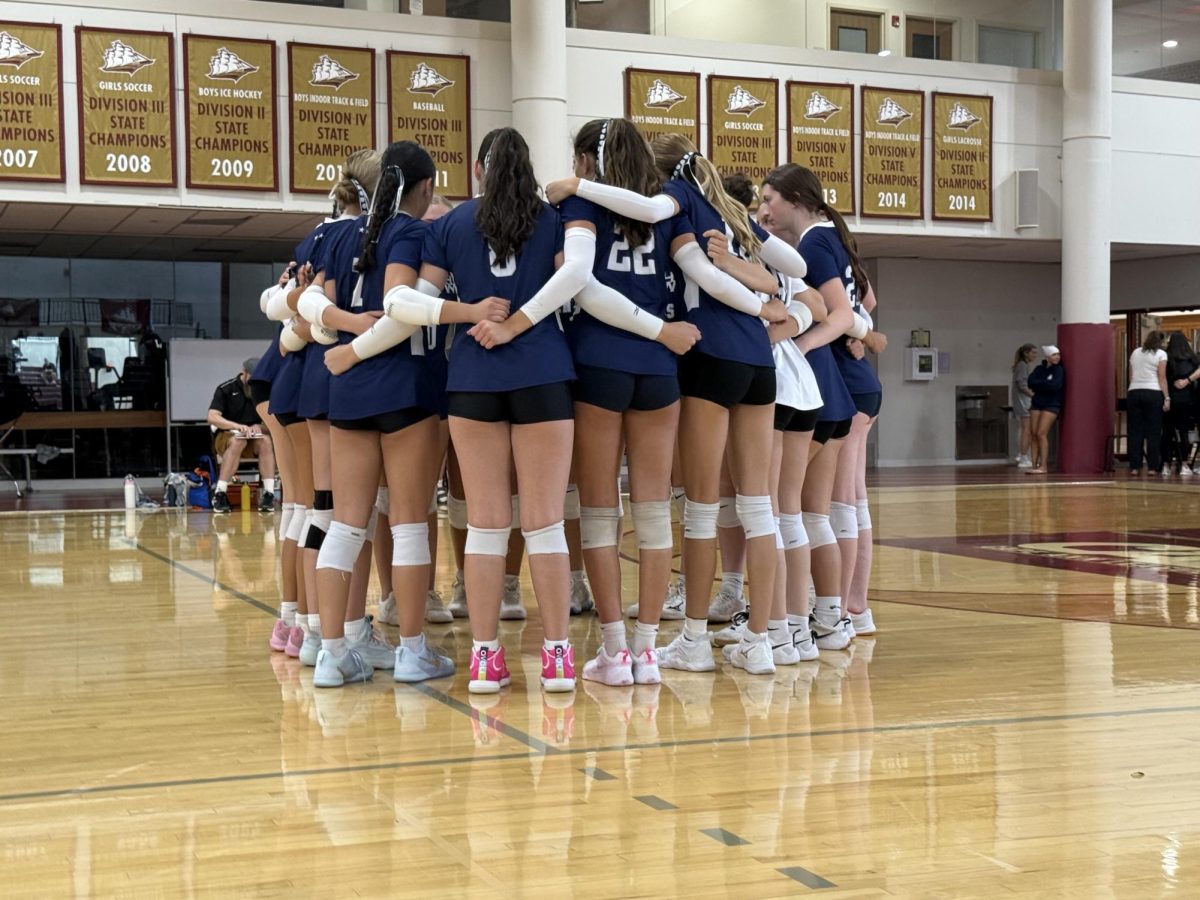As a ninth grader at Hamilton-Wenham Regional High School concerned about students’ mental welfare, I recently created a survey that asked students whether they felt the school, as a whole, prioritizes their mental health. While more than half of the 72 students who responded believe the high school successfully supports students’ psychological and emotional well-being, 43.1% feel otherwise. The results of this survey present an opportunity for the school community to lower this statistic by continuing communication about students’ mental welfare.
Interestingly, this statistic mirrors a national survey conducted between July 15th and August 1st, 2022 by Ipsos, a global market and public opinion specialist, on behalf of the National Alliance on Mental Illness. A representative sample of 1,015 American teens was asked whether they believe their school gives precedence to students’ mental health. Like the student-created survey at HWRHS, 56% answered yes, while 44% expressed that their school does not put students’ mental well-being first.
As student mental health is becoming one of the most pressing issues facing both schools and students today, it is important to ask students if they feel their school is supporting their mental health and truly listen to their responses so that necessary changes can be made.
For this reason, the most concerning statistic to emerge from the HWRHS survey is that 66.7% of HWRHS students responded that they do not look forward to coming to school. It can’t be because these students feel unaccepted at school, for 81.9% of students responded that they feel a sense of belonging and 87.5% of students responded that they feel included by their peers at school. It also can’t be because these students do not know how to access the counseling department, for 97.2% of students said that they do.
What the survey overwhelmingly shows is that many students are apprehensive or unhappy about walking through HWRHS’s doors, day after day, because of academics. They are filled with anxiety and/or stress due to upcoming presentations, quizzes, tests, and homework.
Why Some Students Feel Like The School Isn’t Doing Enough
While many students at HWRHS note that the school provides helpful adjustment counselors who are ready and able to assist if needed, they also feel like the school tries to appear like they care, but ultimately does not do enough. As one twelfth grade male student explains, “The school administration talks about [the mental health of students] more than it actually does something about the mental health [of students].” Another surveyed student reveals, “[The school] says they [prioritize students’ mental health], but not much happens about it.” Similarly, an eleventh grade female student expresses, “[The school] sends out surveys and makes sure we know we have help but the [amount of] work contradicts all of that and they make us do so much that the good things don’t even matter.”
For those students who feel like the school does not prioritize students’ mental health, it partly comes down to the amount of homework that teachers assign to students on a nightly basis.
Academic Stress
Many teachers and school administrators assume that homework is inherently good or valuable, but is it? Homework in and of itself is not the problem, as there are benefits to homework: it helps reinforce what is learned in class and helps foster a strong work ethic and life skills that will be necessary outside the confines of school as one matures. The problem is excessive homework, which studies have actually found to be counterproductive and detrimental to students’ mental wellbeing.
A 2013 study conducted by Stanford researcher Denise Pope and published in The Journal of Experimental Education (Vol. 81, 2013, issue 4) found that too much homework can reduce its effectiveness and have the opposite intended effect. The findings show that the benefits of homework plateau at around two hours per night. After that point, not only do students fail to learn much more, but they actually tend to forget what they have already learned.
It is kind of like sensory overload, which is when a person’s five senses take in more information than their brain can process. A person becomes so overwhelmed that their brain enters a fight, flight or freeze mode. This is what can happen when teachers, as a collective whole, assign more than two hours of homework a night. Yet, as this 2013 study shows, high performing high schools like HWRHS, on average, tend to assign about 3.1 hours or more of nightly homework. This is a problem. Though a student from a high performing school may have a slight competitive edge when it comes to applying to colleges, they may feel so burned out, stressed, and overwhelmed that it negates the benefits of homework.
In the 2013 study, 56% of the students surveyed considered homework a primary source of stress, with 43% citing test preparation as a primary stressor. Only 1% of the students felt that homework was not a stressor. Many students in this 2013 study, who spent more than two hours a night on homework, reported that they experienced physical health problems, such as headaches, stomach problems, exhaustion, sleep deprivation, undue stress, and a complete lack of balance. Students also claimed that they were forced to drop activities, cancel time with friends, or cut back on outside interests or hobbies as a result of the amount of homework.
Similarly, several HWRHS students report experiencing emotional and physical setbacks with both their health and life outside of school. The HWRHS survey indicates that 52.8% of respondents feel overwhelmed by the amount of homework given nightly, with 43.1% indicating that they sometimes feel overwhelmed. This means that only 4.1% claim that they do not feel overwhelmed by the amount of homework assigned.
In the HWRHS survey, students repeatedly express how difficult it is for them to achieve any sense of balance in their lives as a result of the copious amounts of homework they are assigned nightly. One tenth grade female student relays, “I think the school is trying to prioritize mental health, but at the same time gives too much homework that students do not have time to rest and sleep after school or extracurriculars.” This thought is echoed by a ninth grade female student who reveals, “I don’t think [the school does prioritize students’ mental health], because they assign so much work that I don’t have time to live my life.”
The HWRHS survey also shows that such a lack of balance and stress negatively impacts students’ mental health. Students, for example, were asked to rank — on a scale of 1 to 5, 5 being the worst — how they feel homework impacts their mental health. The results are alarming: 63.9% — more than half of the respondents — rank the impact of homework at a level 4 or 5, (4 is 45.8%, 5: 18.1%).
Students’ comments repeatedly back up this statistic. A tenth grade female student reveals, “Extensive work given in each class keeps students up late (no sleep), therefore diminishing their mental health.” Another tenth grade female student expresses, “I just feel like a lot of the times teachers tend to pile up everything on students on the same day. They probably don’t mean to, but it just causes an excessive amount of stress when it doesn’t need to.” Still another tenth grade female student laments, “There is a lot of stress especially towards the end of quarters or weeks before break when teachers pile on the assessments all on the same day and it can be very overwhelming.”
These comments are just the tip of the iceberg. There are numerous comments from respondents expressing the same opinion: There is too much nightly homework, and it is not only overwhelming them, but preventing them from truly living a meaningful, joyous life.
Is There A Solution?
After examining the results of the HWRHS survey on students’ mental health, it becomes apparent that one of the main reasons why 43% answered that the school does not prioritize students’ mental health is that it does not set or enforce guidelines on how much each teacher can assign for homework each night. As one eleventh grader voices, “If school prioritized our mental health, there would be limits on homework (to a certain amount of hours).”
Nevertheless, this is a complex issue. Students sometimes voluntarily choose to take all advanced classes rather than a balanced load, because they feel pressure from home, from the college process looming, or from their own expectations.
However, the onus is not necessarily on students, but on the teachers and the administration to understand what is considered too much homework. Though setting such limits is difficult, as there are different academic tiers such as CP, Honors, and AP, it is still essential and can be achieved. An advanced course should not be considered advanced simply because it assigns more homework than a CP course; rather, it should be considered an advanced course because it teaches at a faster pace and provides a more in-depth look at a subject. This can still be accomplished with less homework.
Furthermore, it may be advantageous for teachers at each grade level to engage in ongoing communication with each other throughout the year about the amount of homework they are assigning nightly and the dates that they are planning on giving tests, essays, presentations, or group discussions. Grade-level teachers could even survey their students once per quarter to see if they need to lighten the course load or spread out their assignments and assessments.
The Need For Adjustment Counselors Reaching Out To Student Body

The survey shows a second reason why some students believe the school is not prioritizing their mental wellbeing: the school does not require adjustment counselors to conduct mandatory, in-person check-ins. Though the school counseling office does survey all students and connect, that day, with students who identify themselves as stressed or in need of support, they do not provide obligatory, personal sessions. While many people may assume that teenagers would bristle at the idea of having to talk to a counselor about their mental health, a surprising amount of students actually expressed otherwise. A ninth grade female student conveys her disappointment that “if you don’t ask for help, you won’t really get any.” She continues, “I feel like many students are afraid of asking for help and end up suffering in silence.”
Similarly, an eleventh grade male student explains, “I know that a lot of people have a hard time with just coming forward [and asking for help], and that’s the hard part. But when they do, there’s usually some people there to help.” A ninth grade female student adds, “I think [the school] does prioritize a student’s mental health, because there are many counselors for students to talk to.”
Nevertheless, if adjustment counseling meetings were proactively scheduled throughout the year, they would help those teenagers who find it difficult to reach out for help when they are struggling emotionally. In that vein, a twelfth grade male student shares, “Sometimes kids are afraid to talk about their mental health with people at school, so if there is any better way to check in on everyone just to see if they are okay, that would be beneficial.”
The survey indicates that some students at HWRHS would welcome mandatory check-ins with an adjustment counselor the way that they now have such check-ins with their guidance counselor. This not only would show them that the school genuinely prioritizes their mental well-being, but would also help them cope with their growing anxiety and pressure throughout the school year.
The hope is that the school will engage in more conversations about students’ mental health and take some proactive steps to stem the tide of anxiety and pressure: regular meetings amongst grade-level teachers, enforced guidelines for teachers on the amount of homework assigned nightly, required adjustment counselor sessions. It is important that a majority of the student body look forward to coming to school on a daily basis, not just 33.3%, as it stands now. With the support of the administration, school counseling department, and teachers, this growing trend can be reversed so that students can obtain a strong high school education while maintaining their mental well-being.





















